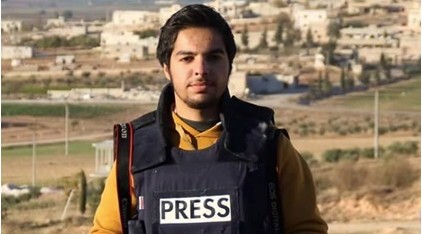PHOTO: Journalist Bahaa al-Halabi: “I’ll continue to report the pain and suffering of innocent people”
Bahaa al-Halabi is a 19-year-old journalist who reports from Syria’s largest city Aleppo.
On June 5, al-Halabi turned from reporter into victim amid one of the numerous Russian and regime airstrike on opposition-held areas.
“All of a sudden I looked up and saw parts of a building falling towards me,” al-Halabi, who works for the Anatolia News Agency and the Aleppo Media Center, told Syria Direct.
He was trapped for 10 minutes in the rubble, “I thought I was dead.” Civil defense volunteers and a fellow journalist rescued him.
He has returned to his work, “As a reporter, I tell the world what is happening. This bombing won’t stop me.”
Tell me about yourself. What did you study?
I’m Bahaa al-Halabi and I’m 19 years old. I didn’t finish my studies after high school because I wanted to join the revolution. Right now I’m working with the Anatolia News Agency and the Aleppo Media Center.
Why did you decide to become a journalist, knowing the risks they face?
My father is actually a journalist. As a young person in Syria when the revolution broke out, I decided that my camera and my word were effective weapons. This work gives me an opportunity to inform the world about the injustice and oppression inside my country. I’m not afraid of my fate because I’m serving my country. All of my fellow journalists have the same goal.
Tell us what happened when the building fell on you?
I was in Al-Qatriji neighborhood covering the damage caused by air strikes. Then I decided to go home. On my way I stopped to cover another area that was being bombed. I stood in the corner of one of the buildings so I could shoot. Suddenly, there was the sound of a missile hitting. I looked up and saw parts of the building falling towards me.
For the first few minutes, I thought I was dead. I realized that I could move one of my hands and my feet, but it was hard because I was too scared. Then I heard the ambulance sirens. They got closer so I yelled. I tried moving again to escape from underneath the rubble. Suddenly, someone grabbed me and pulled me out of the debris. I saw the Civil Defense team and dust everywhere. Then I lost consciousness.
When I regained consciousness, I saw [my colleague] Yasar beside me. He took pictures of me and said, “thank God you’re okay.”
After a few hours, I was able to move again.
I was truly terrified. I usually don’t get this scared when it comes to bombings but this time was different. I was scared to death. I don’t know how I survived; it was a miracle.
Despite these unavoidable risks in the field, will you continue your work? Even after you miraculously survived this bombing?
I’ll continue to report the pain and suffering of innocent people. I’ll continue to reveal the crimes of the regime, Russia and Iran. In fact, I just covered the bombing of the Sakhor district this afternoon. As a reporter, I tell the world what is happening. This bombing won’t stop me. I will stay in Aleppo until I die.
Have you covered any emotionally difficult events? How did you respond?
Two days ago, I shot a video of a child crying over his father. I couldn’t stop the stream of tears that flowed down my face. I can’t even describe the event. It was heartbreaking.
There have been other events that I couldn’t document. I couldn’t get a hold of myself.
But as journalists, we have to force ourselves to shoot. If we don’t control our emotions, we won’t be able to unmask the criminals.

